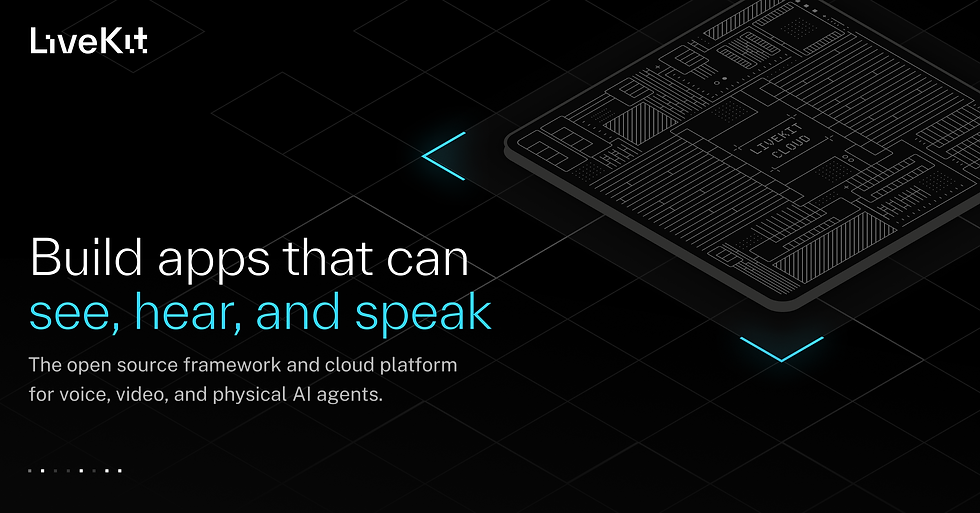LiveKit
- Shaurya Garg

- Sep 4, 2025
- 4 min read
In a world where the value of voice and other AI interactions continues to grow, legacy communications platforms have a lingering problem understanding latency, scalability, and integration with AI applications. The demand for reliable, flexible, and intelligent real-time infrastructure has reached a tipping point. Developers are utilizing call centers, telehealth, voice assistants, and autonomous vehicle systems, and are no longer willing to settle for the well-defined, linear directions of on-premise or cloud services. In 2021, Russell d'Sa and David Zhao co-founded LiveKit to provide developers with an open, AI-native communication platform. The firm is touted as "the delivery network for AI" and they provide the ability to build real-time audiovisual communications and global data solutions, allowing developers to create multimodal applications. They are building on WebRTC-based media servers and cross-platform SDKs..." SDKs are available in JavaScript, Swift, Kotlin, Flutter, Unity, Python, and Go. The LiveKit Agents Framework allows developers to integrate into their applications voice recognition, text-to-speech capabilities, and conversational AI.
LiveKit’s momentum is apparent with its growth and popularity. The company is now supporting over 100,000 developers across the globe, while the firm Cloud is processing in excess of 3 billion calls annually. These hosting environments are used across verticals to support applications in missions of safety and mission-critical applications such as: aeronautics, response to emergencies, AI assistants, and in the case of 911 dispatch centers, which reportedly saved lives because one in four U.S. 911 dispatch centers rely on the firm’s infrastructure. And LiveKit’s tech is included in the products and services of some heavyweights such as OpenAI, Meta, Spotify, and Reddit—a good sign of their ability to deliver production-grade environments. With the majority of their roughly 34 to 50 person team located in San Jose, California and with a growing global infrastructure footprint, their small, ambitious team has a surprising impact.

On the financial side, the company has received ample support for its continued growth. In June 2024, LiveKit raised $22.5 million in a Series A round led by Altimeter Capital, with participation from Redpoint and angels focused on AI including Jeff Dean, Elad Gil and Amjad Masad. Less than a year later, in April 2025, the firm raised $45 million in a Series B round led by Altimeter (again), Redpoint and Hanabi Capital in a round which brought the total amount raised by the company to about $83 million. Its valuation increased from roughly $110 million in 2024, to about $345 million at the Series B. The company's current annual recurring revenue is about $3.7 million in 2025, and it is still investing sharply into product and its global reach, so it is not currently profitable. This approach is common for fast-scaling infrastructure startups that are prioritizing adoption and innovation over current profit margins.
LiveKit's pricing and earning mechanism is flexible. Developers can self-host the company for free, but the firm makes most of its revenue from its managed service LiveKit Cloud. The firm Cloud is powered by a usage-based approach where customers pay for the quantity of audio and video minutes they consume as well as enterprise customers who subscribe for premium features like enhanced compliance, dedicated support, and global reliability. The hybrid structure allowed LiveKit to balance and support community growth via an open-source base, while also securing recurring revenue from enterprise customers, not compromising the accessibility of the product while also providing sustainability.
Although there are many competitors in an overlapping space with LiveKit, such as Twilio, Agora, and Daily.co (real-time communication and real-time video APIs), there are also new competitors with a voice AI agent focus such as Vapi, Retell, and Lindy. The company stands out because it is open-source, customizable, and most importantly has an AI-native architecture. Unlike a closed platform like Twilio or Agora, LiveKit allows developers complete visibility and control. Compared to plug-and-play approaches offered by Daily.co and more recent competitors, it is best suited for teams needing a highly customized solution. The orgnization has broad application support beyond voice only, as a result it is likely a more appropriate alternative even to smaller voice-only players. Developers are excited about using LiveKit because it is more flexible and production-ready than alternatives like Pipecat, with many indicating that its extensible framework makes it uniquely well-suited for building custom and scalable, real-time, AI-based user experiences.
With sufficient funding, increasing growth in staff, and a rapidly expanding ecosystem, LiveKit is strategically placing itself as a key building block in an age of AI-native communications. CEO Russ d’Sa stated it best, “we're building the delivery network for AI - enabling agents that can see, hear, and speak like us.” As the firm ramps up global infrastructure and platform development, it appears to be in a great position to push ahead of real-time communication and AI. Just as Cleo reinvented how we connect to personal finance by making it conversational and fun, LiveKit is changing how we connect, making the human and machine experience as simple, expandable, and smart as it could be. Even with its unique proposition of open-source transparency, enterprise-grade scale, and AI-native, LiveKit is likely to become incrementally more intuitive in the coming years.
Click here to access LiveKit's website.









Comments